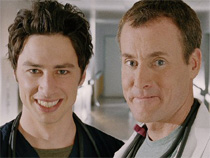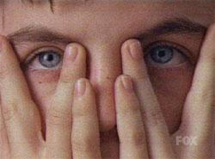July 11, 2005
Feature
The Sitcom is Dead. Long Live the Sitcom?
| There might not be as many of them out there as people would like, but in terms of quality, I firmly believe there are far more fresh, funny and innovative comedies on TV today than there have been in years. |
Now, you might remember that not even five years ago, sitcoms were everywhere. Not only were they everywhere, but everybody was talking about them.
Seinfeld was declared one of the best shows on television, ever. Friends seemed to gain momentum with each passing season, spawning a rotating door of imitators, mostly produced by NBC to follow it and keep its audience, with no success. Frasier was winning Emmy after Emmy, and Everybody Loves Raymond went from cult hit to beloved classic.
Each season the network schedule was filled with new sitcoms, and whole nights of comedy, with even movie stars such as Bette Midler and Whoopi Goldberg wanting to join in the party. After Sept. 11, 2001, there was a lot of talk about how sitcoms would enjoy a renaissance as people turned to comfortable formats and familiar Friends for comfort.
However, as time passed, the most prominently successful shows finished their runs and viewers were left with only the mediocre knock-offs (King of Queens, Yes Dear) and bad time-fillers (According to Jim, Yes Dear) to watch, and many people decided to watch reality TV or switch to cable for laughs instead. A few sitcoms have managed to become success stories, with Two and a Half Men and Joey cracking the top 20, but these shows will never be beloved on the same level as classic sitcoms such as Cheers or M*A*S*H . They will never be talked about at the water cooler, or featured on the cover of Time Magazine, or inspire people to gather together in living rooms or bars to watch them. Gone are the days when the traditional sitcom truly captured the public's attention and imagination.
 |
This move toward single-camera comedy is not new. Nor is its gaining popularity unprecedented. From as early as the late '80s there has been a move toward a new kind of smart, fast-paced comedy without a need for a laugh track or a live studio audience. In fact, in 1990, the most popular comedy on television was just such a renegade. Amid the enormous successes of traditional sitcoms such as Roseanne, The Cosby Show and Married with Children, The Simpsons' reigned supreme. Intelligent, fast-paced and full of so many good jokes that you had to often go frame-by-frame to catch them all, The Simpsons is the forefather of today's television comedy. It didn't need to adhere to any format. It was original and thought-provoking and to this day is one of the most beloved series in television history.
If The Simpsons was the one show that started the ball rolling, then HBO as a network can be credited with keeping it rolling. HBO has had enormous success with comedies since its beginning in the late '80s, and not one of its success stories has been a traditional sitcom. The Larry Sanders Show, Curb Your Enthusiasm, Sex and the City , these series proved that television comedy could succeed without a laugh-track, or an audience, or even commercials. They proved that TV comedy could be edgy and controversial and uncomfortable and most importantly, funny as hell.
 |
Which brings me to the show that everybody seems to be talking about lately, everybody who loves comedy and everybody who loves television. This the show that could change the sitcom's future, and cement the single-camera format as the most important format for comedy on TV: Arrested Development.
Everybody who loves sitcoms, in any format, should be watching this show. Arrested Development crosses that line between being funny and being pee-your-pants hysterical. It somehow manages to blend wit and intelligence with slapstick and farce each week, so that no matter what your sense of humor, there's a joke for you. Within the humor and the playful take-no-prisoners attitude of the show, there's also serious drama, as the family at the centre of the show goes through an emotional upheaval. It's supremely quotable ("Steve Holt!"; "I've made a huge mistake"), always memorable and makes you want to keep watching. It's the only show on the air right now that makes me call everyone I know who watches it after I see it, so we can discuss what we just saw. I made fans out of my mother, my siblings and all of my friends. It's already got a reputation that's almost legendary.
The problem is, it's also very hard to understand. It's full of in-jokes, shout-outs to fans and references to past episodes. It has a very devoted and rabid fan following, but beyond that cult audience the show is having a hard time finding an audience. It took many people I know four or five episodes before they really saw its brilliance, and there are many people out there who are not willing to give a show that kind of time. Arrested Development almost didn't survive to see a second season, or a third. Fortunately, it's gotten another chance, but even a cat will eventually run out of lives.
| That's the great thing about the single-camera format. It offers far more opportunity to think outside the box than the traditional insulated comedy ever did. It offers the chance to create something truly new and fresh, instead of something derivative or predictable. Although I'm sure some of them will be both. |
So if you get a chance, watch Arrested Development . For television's sake. And if you already watch it, well, then I have one thing to say to you: Remember, there's always money in the banana stand.
Email the author.
All written content © 2005 by the authors. For more information, contact homer@smrt-tv.com
